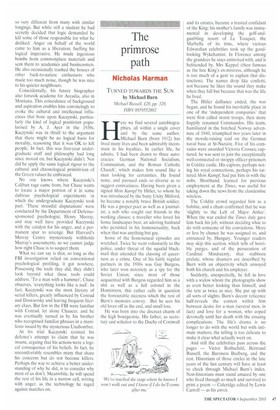The primrose path
Nicholas Harman
TURNED TOWARDS THE SUN by Michael Burn Michael Russell. £20. pp. 320, ISBN 0859552802 Here we find several autobiographies, all within a single cover and by the same author. Michael Burn (born 1912) has lived many lives and been admirably inconstant in his loyalties. In earlier life, he admits, 'I had been drawn to three autocracies: German National Socialism, Communism, and the Roman Catholic Church', which makes him sound like a man looking for certainties. He found none, and pursued ends so diverse as to suggest contrariness. Having been given a signed Mein Kampf by Hitler, to whom he was introduced by the batty Unity Mitford, he became a notably brave British soldier. He was a proper poet as well as a journalist; a nob who sought out friends in the working classes; a traveller who loved his home landscapes best; an adoring husband who persisted in his homosexuality, back when that was anything but gay.
Some of the homosexual episodes are wretched. Twice he went voluntarily to the police, under threat of the squalid blackmail that attended the classing of queerness as a crime. One of his fairly regular partners in the 1930s was Guy Burgess, who later won notoriety as a spy for the Soviet Union; since most of those acquainted with Burgess regarded him as a shit as well as a full colonel in the Homintern, this rather calls in question the honourable niceness which the rest of Burn's memoirs convey. But he sees his old lover off in the end, and small loss.
He was born into the discreet charm of the high bourgeoisie. His father, as secretary and solicitor to the Duchy of Cornwall and its estates, became a trusted confidant of the King; his mother's family was instrumental in developing the golf-andgambling resort of Le Touquet, the Marbella of its time, where various Edwardian celebrities took up the goodlooking Wykehamist. In Florence among the grandees he stays uninvited with, and is befriended by, Mrs Keppel (then famous as the late King's ex-mistress, although he is too much of a gent to explain that distinction). The names drop like confetti, not because he likes the sound they make when they fall but because that was the life he lived.
The Hitler dalliance ended, the war began, and he found his inevitable place in one of the 'independent companies' that were first called storm troops, then more happily renamed Commandos. His team, humiliated in the botched Norway adventure of 1940, triumphed two years later in the morale-raising raid on the German naval base at St-Nazaire. Five of his comrades were awarded Victoria Crosses; captured, he was sent to join the exceptionally well-connected or stroppy officer-prisoners in Colditz castle. His captors, perhaps noting his royal connections, perhaps his tattered Mein Kampf, had put him in with the nobs. Shorthand, learned for previous employment at the Times, was useful for taking down the news from the clandestine wireless.
The Cold itz crowd regarded him as a bolshie, and a chum confirmed that he was 'slightly to the Left of Major Attlee'. When the war ended the Times duly gave him back his job, without deciding what to do with someone of his convictions. More or less by chance he was assigned to, and entranced by, Hungary. Younger readers may skip this section, which tells of horrible purges, and of the persecution of Cardinal Mindszenty, that stubborn prelate, whose disasters are described by Burn with an objectivity which annoyed both his church and his employer.
Suddenly, unexpectedly, he fell in love with a widow whom the photographs show as even better looking than himself, and the text as twice as nice. She put up with all sorts of slights; Burn's decent reticence half-reveals the contest within him between desire for a man (several men, in fact) and love for a woman, who coped devotedly until her death with the ensuing complications. The life's drama is no longer to do with the world but with intimate matters; the telling is too delicate to make it clear what actually went on.
And still the celebrities pass across the pages — Victor Rothschild, Bertrand Russell, the Baroness Budberg, and the rest. Historians of those circles in the late years of the last century will have at least to check through Michael Burn's index. Non-historians must stand amazed by one who lived through so much and survived to print a poem — Coleridge edited by Lewis Carroll — as his envoi.










































































 Previous page
Previous page